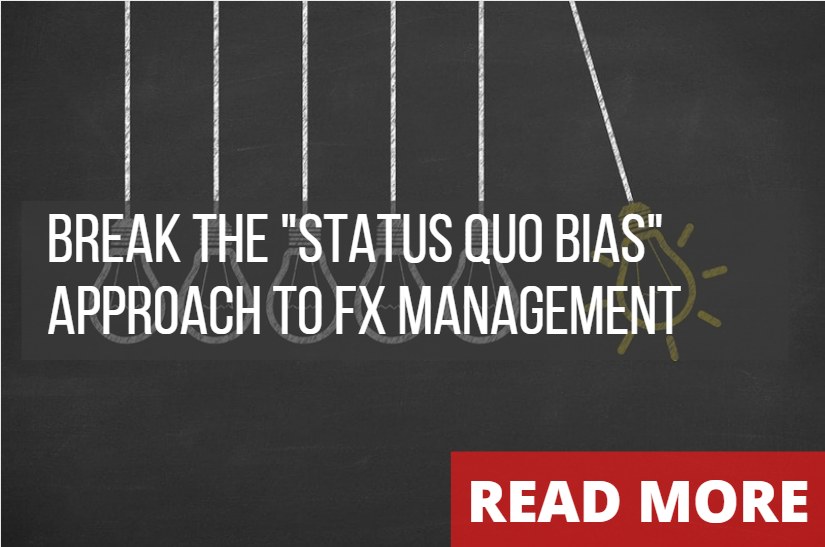FX INSIGHTS
Arguments For and Against Foreign Currency Hedging
Recent geo-political events have increased volatility in just about every world market, and especially in the foreign exchange market. Sharp forex moves due to Brexit, the current civil unrest in France, the recent downturn in world stock markets, and the Federal Reserve raising interest rates were just a few of the recent market jolts that reminded those doing business abroad of the importance of hedging forex risk. As this volatile year ends, those managing foreign currency risks for companies should seriously consider hedging their firm’s forex exposures to prevent an adverse balance sheet impact.
Due to recent market volatility, many corporate treasurers now consider implementing next-generation forex management in their own corporate imperative. Nevertheless, using the latest forex management and hedging techniques can exceed the experience of treasury professionals unfamiliar with the advanced level of analytics and tools currently available. Despite that, a valid argument for hedging forex exposures can be made and presented to less financially-sophisticated professionals, including those higher up in the finance department and senior corporate executives. Treasury professionals who present a strong business case to their CFOs for hedging often rely on certain elements to make their case
Explaining the Advantages of FX Risk Management to the Company’s Board and Senior Executives
For example, by presenting forex risk management techniques as a way to gain more control over variables affecting the company’s bottom line, a treasurer could effectively highlight the advantages of implementing such a program to the company’s senior executives. Also, when a company takes a loss from a currency-related event, the consequences could extend beyond a margins issue or the adverse effect on earnings per share. Repeated losses from currency events potentially erode a company’s earnings, raise expenses and even prompt shareholder complaints. These events result in a ripple effect that could cause the company’s credit rating to decline, thereby increasing the company’s cost of capital and limit their access to liquidity. Another good approach involves informing the company’s top brass that their competitors have already implemented next-generation forex risk management programs.
In the world of finance, forex hedging consists of a risk management strategy employed to limit or offset the possibility of loss due to fluctuations in currency exchange rates. Such hedging involves a transfer of risk by taking equal but opposite positions, such as offsetting an anticipated future cash flow with a forward contract. Corporate managers doing business abroad need to decide whether or not to hedge such risks that involve exposure to an exchange rate.
What is Foreign Currency Exposure?
Having a foreign exchange exposure generally refers to the risk a company assumes when making transactions in foreign currencies. Many mid-sized companies buy or sell products abroad that are denominated in foreign currency, which can thereby directly affect the value of their cash flows in local currency terms when exchange rates fluctuate and the time comes to bring those funds home.
For example, if a company accepts a future payment in foreign currency, the local value of that payment may decline before the payment is received if their local currency appreciates. On the other hand, the value of the payment may appreciate in the event that the exchange rate moves to favor the foreign currency. The same principle applies in reverse to foreign-currency denominated debt.
Furthermore, adjusting future contractual prices of goods to the present exchange rate relevant to a particular country can involve a substantial mismatch when goods are delivered that can lead to a loss of value or competitiveness. Consequently, if a company’s planning horizon is too long, then the firm could be subject to considerable hedging costs. For example, it would cost 3.8 US cents to hedge out 12 months with a forward contract for a US company purchasing Euro to meet a payable.
Disadvantages of Hedging Foreign Currency Risk
Some financial academics argue against the value of hedging despite the fact that foreign exchange risk management clearly reduces the volatility of a company’s domestic profits and maintains the overall value of the company. For example, they may contend that compensating movements in Purchasing Power Parity (PPP) can offset the difference in exchange rate levels seen between contract and delivery. If PPP were to move in the company’s favor, the exchange rate loss would be compensated for, and so there would be no real need to hedge. This is great in theory, but as an example the last time EURUSD reached PPP equilibrium was in July 2014, waiting for mean or equilibrium reversion is a luxury that most corporations can ill afford for transactional exposure.
Other arguments against hedging include the market efficiency hypothesis that suggests because foreign interest and exchange rates are based on all information currently available, no excess returns can be made, thereby making hedging unnecessary. Also, the capital asset pricing model presents yet another argument against corporate hedging. It indicates that a sufficiently-diversified company should not pay to hedge forex expenses when currency fluctuations can be dealt with by adjusting debt and asset portfolios.
Still, none of these theoretical arguments carry enough weight to forego the practical need for a corporate risk management hedging strategy in today’s volatile foreign exchange market. Hedging foreign exchange risk generally makes for good corporate governance because it minimizes the risk of financial distress both for the company’s management and its shareholders. The H1 2018 surge in the US Dollar has exposed the flaws of not hedging. Netflix, which does not hedge its exposure, was amongst the multinationals, along with Oracle, Carnival Corp, and Akamai Technologies, to be hit by the strong US Dollar, citing that the expectation on 2018 operating margins will near the lower end of its target because of the adverse currency impact.
Advantages of Hedging Foreign Exchange Risk
A well-managed foreign exchange risk management strategy can notably protect the value of the company. The company can take prudent steps to hedge its foreign exchange exposures in the forward market. At that point, the company’s hedge value will decrease with an increase in net cash flow due to appreciating foreign currency receivables or the hedge value will increase with a decrease in value of its foreign currency receivables, thereby providing a more stable operating environment. Basically, by implementing a prudent hedging strategy, corporate managers can reduce the volatility of the value of expected cash flows in local currency terms.
Furthermore, a corporate manager implementing a prudent forex hedging strategy reduces the probability of the company suffering the embarrassment of financial distress due to reported exchange rate losses showing up on the firm’s financial statement.
Leaving foreign exchange risk unhedged could also adversely affect the company’s sources and cost of debt capital — which might increase the firm’s borrowing costs — if debt capital providers demand higher returns due to a perceived increased risk of bankruptcy. A well-planned hedging strategy can eliminate such forex-related financial distress, help assure future returns for shareholders, and keep corporate financing costs manageable to fund ongoing projects. By stabilizing the value of future foreign currency cash flows, the company can also improve its planning capabilities and undertake other international activities that would otherwise not be possible or prudent.
Conclusion
Overall, implementing a prudent hedging program is an essential part of any company doing business in foreign countries, as corporations that have been doing business abroad have known for a long time. Reducing foreign currency cash flow volatility and hedging against adverse forex market moves provides the company confidence in its corporate planning, which is more valuable to shareholders than foregoing opportunity costs, or waiting out for theoretical equilibriums. Financial professionals can be certain that currency risk management will continue to gain importance



